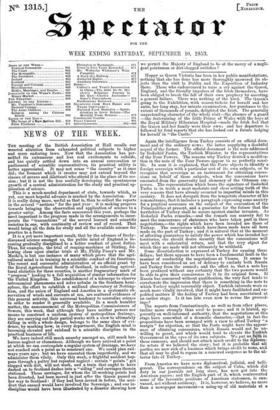Again the intelligence from Turkey consists of an official docu-
ment and of the ordinary news ; the latter supplying a doubtful sequel of the former. The official document is the note addressed by Redschid Pasha, the Turkish Minister, to the representatives of the Four Powers. The reasons why Turkey desired a modifica- tion in the note of the Four Powers appear to us perfectly sensi- ble. In sum it is explained, that the Porte objects to identify a foreign sovereign with a particular sect of its own subjects, or to recognize that sovereign as an instrument for obtaining conces- sions on behalf of those subjects, when the concessions have emanated from the generosity and clemency of the Ottoman em- perors. The representation which bears the signature of Redsehid Pacha is in truth a most moderate and clear setting forth of the very reasons that have already occurred to impartial minds in this country. It does not derogate from the temperate character of his remonstrance, that it includes a paragraph expressing some anxiety for a practical assurance on the subject of the evacuation of the Principalities at present, and a guarantee for the future that the territories of Turkey shall be secure against similar invasion. As Redschid Paeha remarks —and the remark can scarcely fail to meet the concurrence of remarks,—and who have taken part in these negotiations,—the rights which have been invaded are those of Turkey. The concessions which have been made have all been made on the part of Turkey; and it is natural that at the moment of affording guarantees to satisfy the power which has invaded her territories, she should desire security that the concessions will meet with a substantial return, and that the very object for which they are made will not ultimately be withheld.
Some dissatisfaction is expressed at Turkey for causing these delays; but there appears to have been a fundamental fault in the manner of conducting the negotiations at Vienna. It seems to have been considered an act of delicacy to exclude both Russia and Turkey from the council ; and the effect is, that a note has been produced without any certainty that the two powers would be able to give their concurrence to it in its original form. If Russia has concurred without qualification, the very fact tends to corroborate the impression that there is something in the note to which Turkey might reasonably object. Turkish interests were so much more vitally involved, that it might have facilitated and ex- pedited matters if the feeling of Turkey had been ascertained at an earlier stage. Is it too late even now to revise the proceed- in s
The reports from Constantinople, as well as from other places, incline more strongly than ever to peace ; and it is hinted, ap- parently on well-informed authority, that the negotiations at this
stage have somewhat of a dramatic character,—that in fact the propositions have been arranged with a view to afford Turkey "a margin" for objection, so that the Porte might have the appear-
ance of obtaining concessions, which Russia would not be un- willing to grant, and which would tend to elevate the Turkish Government in the eyes of its own subjects. We put no faith in _these rumours, and should not attach much credit to the diploma- tic actors if we believed the story ; but it is probable that all parties are now sick of a business which brings credit to none, and that all may be glad to repose in a renewed suspense as to the ul- terior fate of Turkey.


























